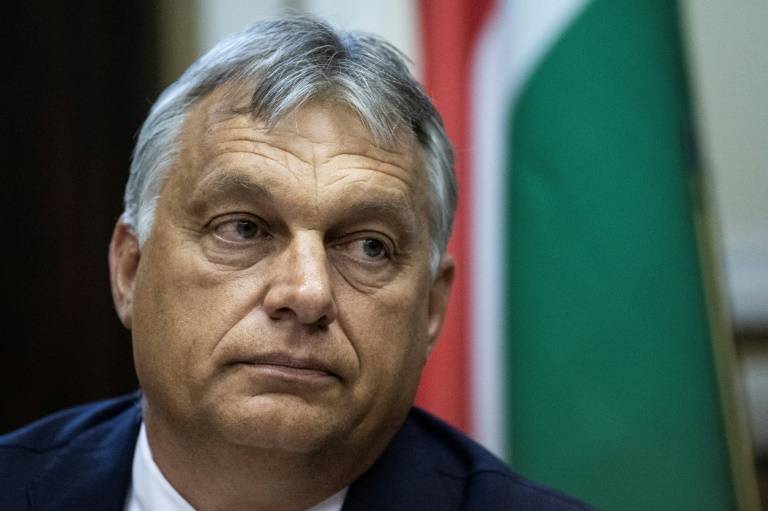European lawmakers will challenge Hungarian Prime Minister Viktor Orban to his face on Tuesday over what they see as his right-wing populist threat to EU founding values.
Orban plans to deliver a "frank and outspoken" defence of his stance before the European Parliament, which will decide whether to start steps that could lead to political sanctions against Hungary.
Budapest argues its anti-migrant measures and its defence of sovereign rights are in tune with the mood of European voters, who will elect a new parliament in Strasbourg next May.
But Judith Sargentini, who is spearheading a vote Wednesday on whether to take action against Hungary, warned her fellow MEPs that the 28-nation bloc's founding values are at stake.
"Do you want the rule of law?" demanded Sargentini, a left-wing Green MEP from the Netherlands.
Her proposed resolution warns that Hungary's actions represent a "systemic threat" to the bloc's democratic founding values.
It voices concerns about the Hungarian judiciary's independence, corruption, freedom of expression, academic freedom, religious freedom, and the rights of minorities and refugees.
Opposition to Orban's vision does not just come from the left.
There is disquiet in the main centre right parliamentary group, the European People's Party (EPP), about his position, despite it including his Fidesz party.
"MEPs from the centre right have a clear choice next week," declared Guy Verhofstadt, head of the liberal ALDE group.
"Support freedom and EU values by sanctioning Orban, or capitulate to far right populists who promote unfreedom."
It would be the first time the European Parliament votes to take steps under article seven of European Union treaties, which could ultimately deny Hungary its EU voting rights.
But the European Commission, the EU's executive arm, launched similar steps under article seven against Poland in December last year over its alleged threat to the independence of the courts.
Poland's ally Hungary has pledged to veto any move to impose such penalties on Warsaw, which would effectively block the measure.
Nor is it clear whether Sargentini's preliminary procedure will win the necessary two-thirds support of the assembly.
While Orban's actions have provoked opposition, they have been applauded by populists elsewhere in the EU, with several prominent far-right figures floating the idea of a pan-European populist alliance ahead of 2019 elections for the bloc.
On Monday the leader of Austria's far-right party, Vice Chancellor Heinz-Christian Strache, said he would "gladly" invite Orban's party into a common bloc, and Italy's new far-right Interior Minister Matteo Salvini has also expressed admiration for Orban.
Frank and outspoken
The Commission, headed by Jean-Claude Juncker, an EPP member, has repeatedly clashed with Orban's government, especially since it refused to admit asylum seekers under an EU scheme launched at the height of the migration crisis in 2015.
In July, the EU executive body warned it could take Budapest before the European Court of Justice over laws which call for up to a year in prison for anyone assisting an undocumented migrant.
These were dubbed the "Stop Soros" laws after liberal Hungarian-born US billionaire George Soros, who is accused without evidence by Orban's government of orchestrating migration to Europe.
The top EU court could impose fines, which would be less drastic for Hungary than losing its voting rights.
Hungarian government spokesman Zoltan Kovacs told reporters in Brussels on Monday that Orban's government sees the parliamentary motion as a "witch hunt", calling it "very dangerous" and "divisive."
He said it has sent MEPs and EU countries a 100-plus page rebuttal of Sargentini's "false" charges and that Orban will give a robust, but brief defence on Tuesday.
Kovacs also suggested that the alliance with Fidesz boosts the EPP's appeal to European voters.
"Our perspective is something that would help the EPP remain the strongest political community or group in the European Parliament," Kovacs said.
The liberal-versus-populist battle has split Europe at the highest levels.
The EPP is led by Manfred Weber, an ally of German Chancellor Angela Merkel who last week announced his bid to succeed Jean-Claude Juncker as head of the European Commission next year.
"The big issue is how the EPP will vote, particularly Mr. Weber," said Maria Joao Rodrigues, a leading Portuguese member of the Socialists and Democrats group, which supports the motion.
In an interview with Austrian daily Standard, Weber said the EPP owes Orban "no special treatment".
French President Emmanuel Macron, an outspoken defender of EU values, has urged the EPP to clarify its stance, saying it could not back both Merkel and Orban at the same time.
Macron said late last month that Orban and Italy's Salvini were right to see him as their "main opponent" on migration.
"I will give no ground to nationalists and those who spread words of hate," Macron said.






